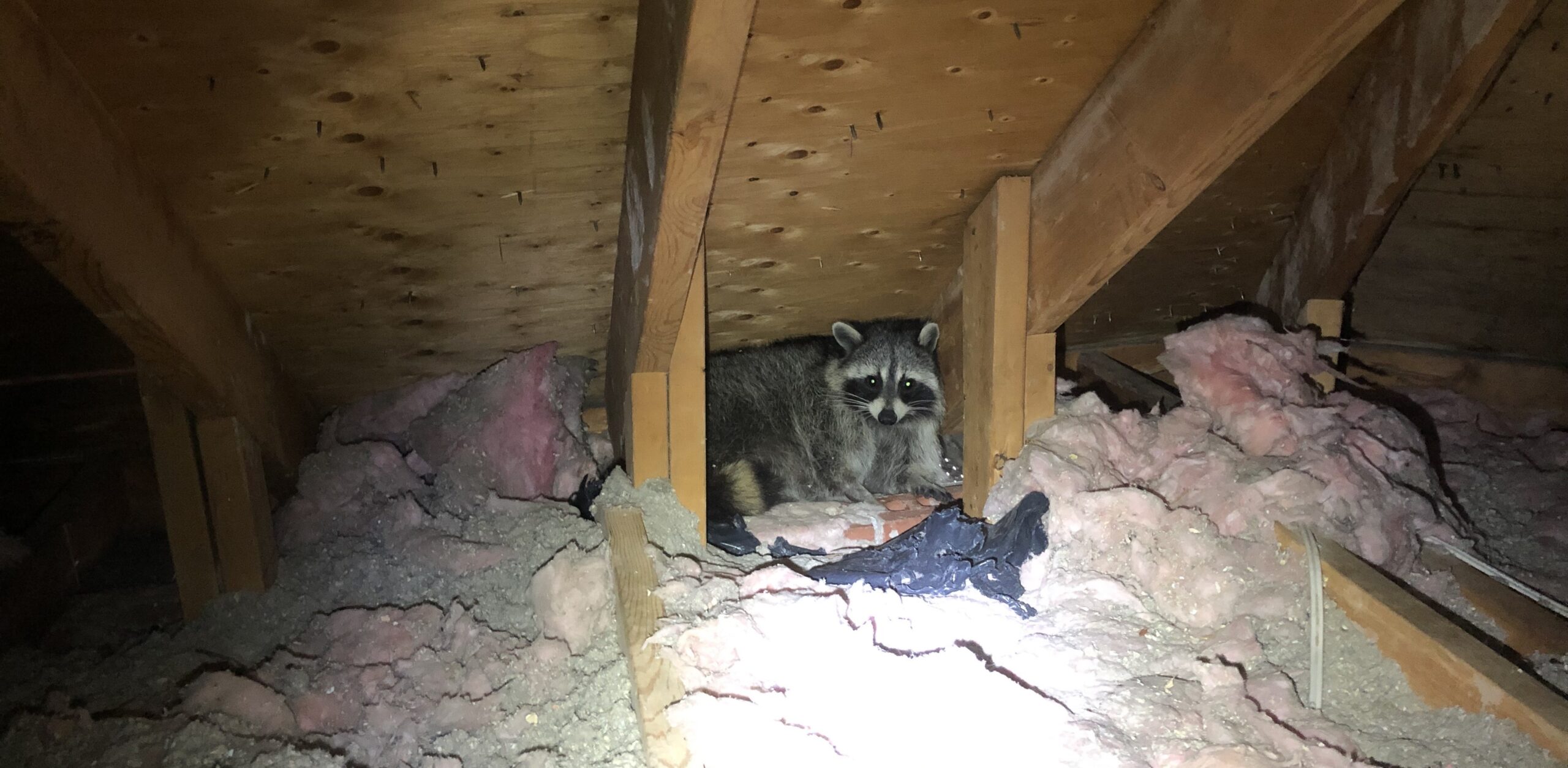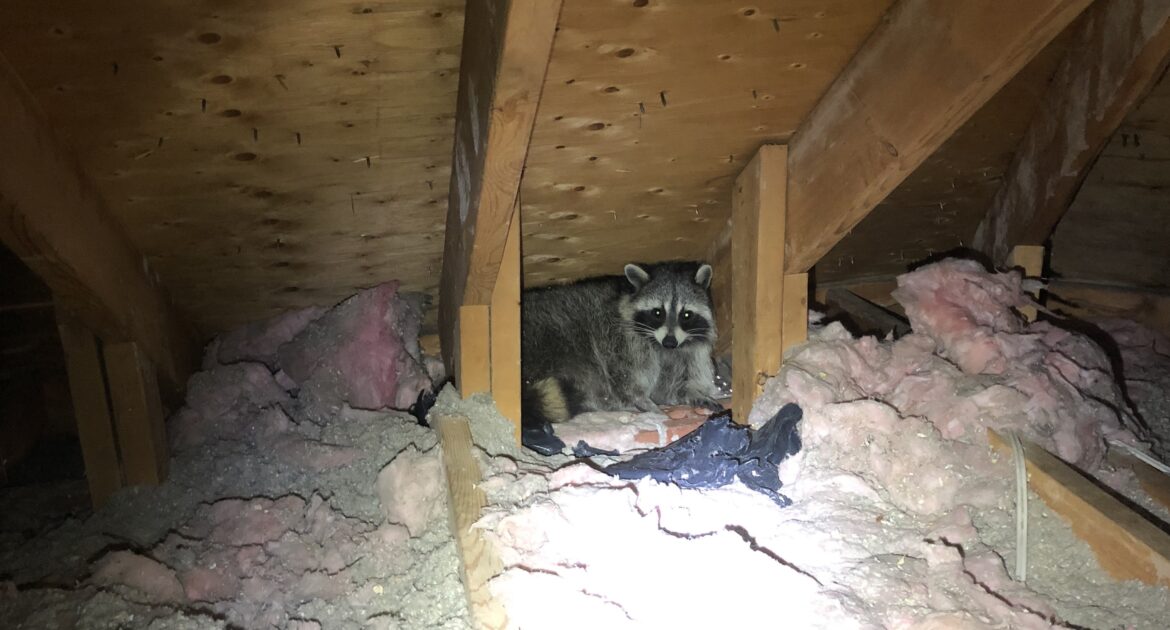If you’re a homeowner in Richmond Hill, you might already know how common raccoons are in our neighbourhoods. These resourceful animals may seem harmless, but their droppings can potentially carry a hidden danger that many people don’t know about: raccoon roundworm. This parasitic infection is rare but can have serious consequences for humans, especially children. Fortunately, there are steps you can take to protect your family from raccoon roundworm dangers.
Below, we’ll explore raccoon roundworm in more detail, discuss how the infection spreads, and, most importantly, highlight effective raccoon roundworm prevention strategies to safeguard your home and your loved ones.
Raccoon Roundworm Dangers
Raccoon roundworm, scientifically known as Baylisascaris procyonis, is a parasitic infection that originates in raccoons. These parasites thrive in raccoon intestines and are expelled in massive quantities through raccoon feces. One raccoon can shed millions of eggs daily, contaminating soil, gardens, and surfaces around homes.
The danger of raccoon roundworm lies in the eggs. When ingested, these eggs can hatch in the human gut, releasing larvae that may travel to critical parts of the body such as the brain, eyes, or other organs. This can lead to severe conditions like neural larva migrans (affecting the brain) or ocular larva migrans (affecting the eyes), with symptoms that include:
- Nausea and fatigue
- Loss of muscle control or coordination
- Blindness
- Coma in extreme cases
While human infections are rare, those who contract raccoon roundworm face potentially life-altering consequences. Children tend to be at a higher risk because they are more likely to come into contact with contaminated soil or objects and may inadvertently bring dirty hands to their mouths.
At Skedaddle, we’ve worked with countless homeowners across the Greater Toronto Area and seen firsthand the fallout from ignoring this silent health threat. Early identification and understanding of these dangers are critical to keeping your family safe.
Raccoon Roundworm Prevention
Prevention is key when it comes to minimizing the risks associated with raccoon roundworm. Following these practical steps can significantly lower the chances of contamination around your home:
- Regularly Clean Known Raccoon Latrines
Raccoons often defecate in specific areas called latrines, commonly found on tree stumps, roofs, or garden beds. These areas are hotspots for raccoon roundworm eggs. Cleaning latrines can prevent long-term contamination, but it’s essential to handle feces carefully to avoid exposure. Always wear gloves, use disposable tools, and dispose of waste in sealed plastic bags.
- Supervise Children’s Outdoor Play Areas
Raccoons are drawn to playgrounds, sandboxes, and grassy areas. Covering sandboxes when they’re not in use and inspecting outdoor toys for contamination are easy ways to limit exposure. Teach your little ones the importance of washing their hands after playing outside.
- Discourage Raccoons from Coming Near Your Home
Raccoons are opportunistic feeders and are often attracted to garbage, pet food, or bird feeders. Ensure your garbage bins are animal-proof, remove food sources, and consider installing motion-sensitive lights around your yard to deter raccoons.
- Inspect and Seal Entry Points in Your Home
Raccoons look for easy entry points to attics, chimneys, and crawl spaces where they may establish dens. Regularly inspect your roof, vents, and siding for vulnerabilities. Use heavy-gauge screening to seal any gaps to keep raccoons out.
- Remove Food Sources from Gardens
Raccoons are especially drawn to fruit trees and vegetable gardens. Picking up fallen fruit and using fencing can help make your garden less appealing to them.
- Adopt Professional Cleaning for Heavy Contamination
If you suspect raccoons have been living in your attic or other areas of your home, professional cleaning services are critical for preventing the spread of infectious eggs. At Skedaddle, we use specialized equipment that eliminates contamination and safeguards your home’s health.
Practicing these measures will drastically reduce the chances of exposure to raccoon roundworm eggs and help ensure that your outdoor spaces remain safe for your family.
Protect Your Family from Raccoon Roundworm
When it comes to safeguarding your family, proactive steps make all the difference. Here are additional actions you can take to protect your family from raccoon roundworm:
Educate Your Family and Neighbours
Awareness is one of the most effective forms of prevention. Discuss raccoon roundworm dangers and safety precautions with family members, and encourage neighbors to keep shared areas clean to reduce risks in your community.
Train Pets to Avoid Raccoon Feces
Outdoor pets like dogs may inadvertently bring raccoon roundworm eggs into your home. Prevent access to areas frequented by raccoons and regularly check your property for feces.
Act Quickly When You Spot Signs of Issue
If you notice signs of raccoon activity like torn trash bags, droppings, or noises in the attic, act swiftly to address the problem. The longer raccoons remain on your property, the higher the risk of contamination becomes.
At Skedaddle, we emphasize that prevention isn’t just about stopping raccoons from entering your home; it’s about creating an environment that promotes long-term safety for your entire family.
Why You Need Professional Raccoon Removal
Professional raccoon removal is essential to ensure the safety and well-being of your home and family. Raccoons can carry diseases, including rabies and parasites such as roundworms, posing serious health risks if left unchecked.
- DIY raccoon removal can be dangerous, as raccoons may become aggressive when cornered.
- Their nesting areas may contain harmful bacteria, posing health risks.
- Professional services, like Skedaddle, use humane and effective methods for removal.
- Techniques ensure the safety of both the animals and your property.
Additionally, experts can assess your home for vulnerabilities, seal entry points, and clean affected areas to prevent future infestations. By choosing professional raccoon removal, you not only eliminate the immediate problem but also gain peace of mind knowing your home is secure and protected against recurring issues.
Raccoon Roundworm and Richmond Hill
Richmond Hill, with its lush parks and abundant green spaces like Mill Pond Park, is a beautiful place to live, but it’s also attractive to raccoons. The same environmental benefits we enjoy make Richmond Hill an ideal habitat for these animals. Combined with urban expansion, raccoons and humans frequently cross paths, making prevention efforts even more crucial in our community.
Our team at Skedaddle has helped countless Richmond Hill residents implement effective raccoon roundworm prevention strategies, tailoring solutions to each home’s specific concerns. Whether it involves sealing a vulnerable attic or sanitizing a contaminated area, we understand the unique challenges faced by homeowners here.
Take Action for a Raccoon Free Home
Raccoons are fascinating animals, but when their presence threatens your safety, it’s imperative to intervene. Taking steps to address raccoon roundworm dangers and prioritizing raccoon roundworm prevention not only protects your family but also contributes to healthier communities in Richmond Hill.
Don’t wait for raccoon issues to escalate. Contact us at Skedaddle today to take proactive measures in securing your home and safeguarding your loved ones. Remember, prevention is easier and far more cost-effective than dealing with potential risks after an infection. Give us a call to learn how we can help or schedule an assessment with our expert team.
Together we can ensure that raccoons remain outside where they belong while keeping your family safe and healthy.




